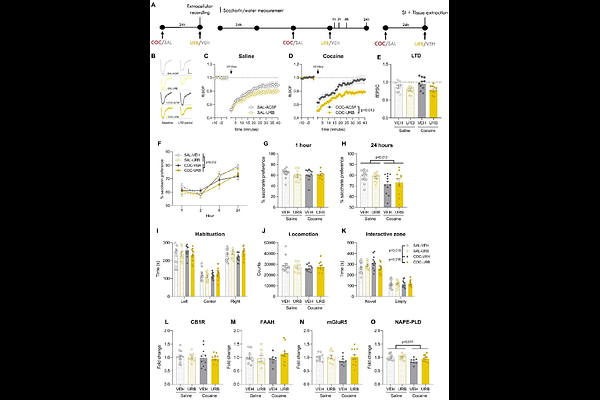Cocaine-induced loss of LTD and social impairments are restored by fatty acid amide hydrolase inhibition

Cocaine-induced loss of LTD and social impairments are restored by fatty acid amide hydrolase inhibition
Alegre Zurano, L.; Caceres-Rodriguez, A.; Berbegal-Saez, P.; Lassalle, O.; MANZONI, O. J.; Valverde, O.
AbstractBackgroundA single usage of a drug of abuse can have lasting effects on both the brain and behavior, continuing even after the drug has been metabolized and eliminated from the body. A single dose of cocaine can abolish endocannabinoid-mediated long-term depression (eCB-LTD) in the nucleus accumbens (NAc) within 24 hours of administration. However, it is uncertain whether this altered neuroplasticity entails a behavioral deficit. MethodsOur study employed adult male mice to investigate the effects of a single dose of cocaine (20 mg/kg) on eCB-LTD, saccharin preference, and social interactions 24 hours after administration. We also examined the gene expression in components of the eCB system. The pharmacological increase of anandamide was evaluated using the fatty acid amide hydrolase (FAAH) inhibitor URB597 (1 mg/kg). ResultsAfter a single dose of cocaine, mice displayed altered plasticity, social interactions, and preference for saccharin and a reduction in mRNA levels of the anandamide-catabolizing enzyme NAPE-PLD. We discovered that the FAAH inhibitor URB597 (1 mg/kg) successfully reversed the cocaine-induced loss of eCB-LTD in the NAc and restored normal social interaction in cocaine-exposed mice, but it did not affect their saccharin preference. ConclusionsOverall, this research underlines the neuroplastic changes and subsequent behavioral alterations that occur after the initial use of cocaine, while also suggesting a potential role for anandamide in the early impairments caused by cocaine. The findings highlight the importance of understanding the mechanisms underlying the initiation of drug use and offer a potential therapeutic target.